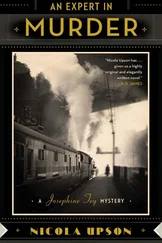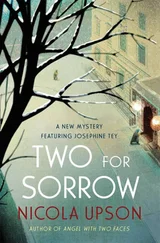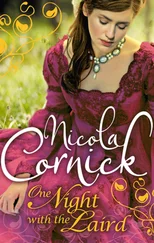‘No. Morwenna said we should keep it to ourselves, and I was to stay at home as much as possible until I felt better. That’s why she got so angry whenever I ran off – but it’s so boring, being stuck in the house all the time.’
‘What about Harry? Did he know you weren’t well before he had his accident?’ If Harry had found out that Christopher was taking advantage of his little sister, that would explain the animosity between them.
Loveday considered the question for a moment. ‘No – he would have done something to make me feel better,’ she said. ‘He always knew how to cheer me up.’
It was the first time that Josephine had heard Loveday use the past tense with regard to her brother. At least she seemed to be coming to terms with that tragedy, although the news of Nathaniel’s death – and possibly Christopher’s – could surely not be kept from her for much longer, and she was bound to be deeply upset when she heard. ‘I know he’s made you cross – I would be, too – but you and Christopher are very good friends, aren’t you?’ she said gently. Loveday nodded, and she looked so sad that Josephine was tempted to try to explain the situation to her: was allowing her to believe that Christopher had betrayed her affections really any kinder than being honest with her about the danger in which he might have found himself? In the end, she decided against it; she could only guess at what had really happened to the boy, and telling Loveday something which she subsequently discovered to be a lie would only make her as insensitive as everyone else. Instead, with the unpleasant taste of treachery in her mouth, she did as Archie had asked. ‘Did Harry ever have a special friend, like you have Christopher? One person with whom he was particularly close?’
‘No. He had me and Morwenna.’
‘Of course he did, but I mean someone different.’ The irony was not lost on her as she added, ‘Someone outside the family.’
This seemed to be a new idea to Loveday. She thought about it, but eventually shook her head. ‘Definitely not. I would have known.’
‘Even if he didn’t want to tell you?’
‘Oh yes. Sometimes I used to follow him, you see, just for fun.’
‘And he didn’t meet anyone, or go anywhere in particular? With Nathaniel, for example?’
‘Into the village, usually. And he did meet people, but not someone to be alone with, not like…’ She left the sentence unfinished and looked down at the sheets, embarrassed. ‘Anyway, Nathaniel wouldn’t be like Christopher, would he?’
Josephine was saved the embarrassment of further explanation by the sound of someone opening the back door. Morwenna had returned sooner than expected, perhaps having had second thoughts about leaving her sister alone to talk to a stranger, and her time with Loveday was clearly about to be curtailed. Footsteps stopped halfway up the stairs, as though Morwenna were trying to listen to their conversation, and Josephine said brightly to Loveday: ‘Would you like me to read you the first chapter before I have to go?’
Loveday nodded enthusiastically, and handed her the book. She had barely got halfway through the first paragraph before she was interrupted, but the voice was not Morwenna’s.
‘I’m sure you mean well, Miss Tey, but I think Loveday needs some rest now.’ She turned to see Morveth Wearne standing in the doorway, her face resolute and brooking no argument. ‘Perhaps you could come back another day.’
It occurred to Josephine that the same offer might have been made to a condemned man with more hope of its being allowed to come true, but she resisted the temptation to jump up as though she were one of Morveth’s pupils. ‘Oh, we’ve been taking it easy, haven’t we?’ she said casually, glancing conspiratorially at Loveday. ‘And it’s good to know that your patient is so much better than she has been of late.’
This last comment could hardly have been more blatant, but Morveth did not even flinch. ‘Then let’s make sure it stays that way,’ she said, opening the door slightly. It was a subtle gesture, but somehow harder to disobey than an outright order to leave.
‘I’ll come and see you again,’ she promised Loveday defiantly. ‘Enjoy the book, and don’t be too careful with it. When you’re better, I’ll let you read some of the new one.’ She bent down to kiss the girl’s forehead, and whispered in her ear so that Morveth could not hear what she was saying. ‘You never know, I might find a role for you in it. But that’s our secret.’
Loveday beamed at her and she left the room, glad that Morveth at least refrained from seeing her off the premises like a poacher discovered trespassing on estate land. As she closed the door behind her and walked down the path, Josephine could feel the eyes burning into the back of her head. She resisted the temptation to turn around.
Chapter Seventeen
Beth Jacks got up from where she had been kneeling on the cold stone floor of the church, and turned away while Jasper Motley tidied his clothes. Such modesty was hardly necessary, he thought, as he watched her wipe her hand quickly across her mouth, but at least she was getting better at masking her revulsion. If anyone had a right to be disgusted, it was he: her face was rarely without the marks of her husband’s fist these days, and that purple stain of shame made it almost impossible for him to take any satisfaction in their sex – if what they did now was even worthy of the name. He had long since abandoned any attempt to force himself on her as he would have liked to; her compliance made no allowance for the sense of power which had first awakened, then guided, his sexuality, and she ought to be grateful that he was willing to continue the arrangement at all.
She took a seat at the vestry table, while he lifted the lid on the panelled oak coffer and removed a black bag. It was an elaborate piece of furniture to store so little that was of value, but he tried not to dwell on its emptiness as he put the money on the table in front of her. He saw an expression of disappointment cross her face as she picked the coins up, one by one – he had not been as generous as usual, but she had more sense than to complain. Instead, she pushed the Bible hesitantly towards him and waited. Impatiently, he chose a passage at random and began to read, keen to get this part of the business over and done with. He had laughed the first time she asked him to do it, scornful of the idea that the humiliating sin of which she was guilty could somehow be absolved by the person who had demanded it, but she had shown a rare moment of strength by insisting on a reading from the scriptures every time, and he obliged her because it cost him nothing. The understanding they shared had, of course, been his idea, and she had looked at him in horror when he first suggested it, but it had not taken her long to come round to the idea. Years of ill-treatment from her husband had dulled her self-respect but sharpened a streak of pragmatism which saw the sense in being paid for her shame, and it was not his place to strip her of the illusion that money would eventually buy her freedom. He had seen men like Jacks before and understood what drove them; there were no lengths to which the gamekeeper would not go to keep what was his, whether he valued it or not.
When the reading was over, he stood at the door in the north porch and watched Beth Jacks walk away through the gravestones, leaving the churchyard by the lych gate and heading back into the estate. The rain had stopped now, and the air felt young and fresh again – cleansed, he would have said, if he were the type to seek regeneration. Looking across at the rectory opposite, he noticed that there was a dark car parked by the hedge; as he watched, his nephew got out from the driver’s side and gazed intently after Beth Jacks, then back at the church. Absentmindedly, Motley rubbed his temple, where a headache had been building all day. He had expected a visit from the police since this morning, when his wife had returned from the village full of the news of Nathaniel Shoebridge’s death. The curate’s obvious antagonism towards him was bound to require some sort of explanation now, but never for a moment had he considered that the police might arrive in the shape of Archie Penrose, and he was suddenly uneasy: he feared Penrose’s intelligence and his integrity – they were so like his mother’s. He had never got to know his nephew – Lizzie made sure of that – and none of the family were regular churchgoers, so he had not even watched Archie grow up from a distance, but he was aware that an unspoken bitterness existed between them which stretched back to the war. Then, like many other preachers in hundreds of pulpits around the country, Jasper Motley had considered it his duty to encourage the young men of his parish to fight for their country, and he had done so with a dedication and a passion which did not usually characterise his sermons. On one such occasion – a harvest festival, he thought it was, right at the beginning of the war – the Penroses made a rare appearance in the family pew, more out of solidarity for William than anything else. He remembered the expression of sadness and scepticism on Archie’s face when the preaching turned to the glories of war, and it had seemed so out of place in someone so young; two years later, having witnessed the horror for himself, his nephew returned to the church, on sick leave after an incident in which his closest friend had been killed. By then, the congregation had dwindled considerably and Archie sat alone in the front pew, directly in line with the gothic Victorian lectern, staring up at his uncle with hatred and blame in his eyes, as if the fighting were somehow his fault. Nothing had been said, but there was such an intensity in the moment that Jasper Motley had, ever since, harboured a secret fear that Penrose would eventually find something for which he could make his uncle pay, no matter how many years it took.
Читать дальше












